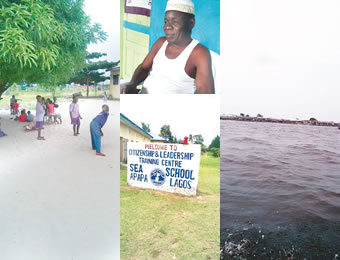In the middle of the lagoon, beside Liverpool Bus Stop at Apapa, Lagos, is a cluster of communities collectively known as “Snake Island”.
“It’s not called ‘Snake Island’ because of the presence of any snakes.” said Chief MAO Aderibole, a retired police officer and older brother of the Baale (community chief) of Nanti, one of the villages on the island. “It’s called Snake Island because the communities here together form the shape of a long snake. The island is large; it begins from the sea school and extends as far as Ibese. So it is a long-distance. All of it is called Snake Island. I may not be able to mention all the villages, because new ones are springing up by the day.”
Water is the sole medium of transportation. The fare is normally N100, and a standard boat can take as many as 13 passengers at once. But it takes time for a boat to be full, especially outside the rush hours in the mornings and evenings. So there is provision for “charter”, and this ranges from N500 to N1000.
It was a fairly long journey. The water was mostly calm, but occasionally it surged, so that the boat struggled momentarily to regain balance. Every passenger wore a life jacket, even though most of the jackets could not be strapped properly – if at ll.
“The life jacket is good,” said Wisdom, the boat rider. “But it is God that saves our lives. Don’t worry, we will get there safely.”
Wisdom, originally from Benue State, had lived at Snake Island for as long as could remember; he said he had seen people die on the water, including very close friends.
“People have drowned here; there have been accidents here. But I thank God that I haven’t died on the water. This boat is the only business I have. It is what I use to feed myself and other members of my extended family.”
Asked how much money he made on a typical day, he said “Enough. I make enough, even though business has been slow recently, and fuel is expensive.”
Snake Island was the location for the first edition of the now rested TV programme, Gulder Ultimate Search (GUS), in 2004. The island is also home to the popular Citizenship and Leadership Training Centre, also known as the Sea School. More than twice, GUS contestants underwent rigorous swimming training at the school before proceeding to their camps.
Nanti
The village closest to the Sea School is known as “Nanti”. It is a corruption of the name “Nathaniel” – the founder of the community.
“Our father, Nathaniel Iwalokun, was the founder of this place,” the community chief, Baale Owoyele Iwalokun, told Saturday Tribune on Wednesday. It is from “Nathaniel” that “Nanti” was formed.
He said the only problem currently facing the community was its age-long feud with one of the companies that operate on the island.
“Our problem is Nigerdock,” he said. “In fact, they were here yesterday (Tuesday). It has been on for a long time. We have even gone to court because of the dispute. It’s not a small case. They took us to Appeal Court. It was there that we were urged to settle out of court. We are still on it. They want us to leave this place; they said they have acquired everywhere here. But that is not possible. Our fathers built this place.”

He continued: “We have not had power for 10 years. The last time we saw power here was 2006. When they (the company) wanted do their construction here… you know the light passed through Kirikiri to Igbologun. We were disconnected when they were doing some construction there. Their construction damaged the poles. We are appealing to them, whether it is the government or the company itself, they should come to our aid. We are not fighting them; we are only appealing to them.
“Light first came in here in 1990; the current power problem began in 2006. Well, some people use generators from time to time, but it is not affordable. You know there has been an increase in the price of petrol.”
Home for all
Nanti, like other villages on the island, is home to people from different parts of the country. A good many of the residents are fishermen and petty traders who own shops at different parts of Apapa. Igbologun, another part of the island, is said to have the highest concentration of crayfish traders.
There are also a number of educated people who live on the island; many of them work at Apapa, some are students, others are retired civil servants. Indeed the Sea School, a Federal Government establishment, has some of its staff quarters on the island.
Dayo, a final-year student at Adeniran Ogunsanya College of Education, Ijanikin, Lagos, was born and brought up at Snake Island. When Saturday Tribune visited on Wednesday, she was returning from school.
“I have always lived here,” she said. “I like it here. It is a small community. Everybody knows one another.”
All the buildings are small and short. Many of them are made of wood. There is an abundance of trees and green leaves. Men and women could be seen sitting in front of their homes, talking and laughing. It was only midday.
Behind the Baale’s home are a health centre and a primary school – Nanti Community Primary School. It was break time; schoolchildren dressed in purple played in the shade provided by a large mango tree just in front of the single block that was the entire school.
Baale Iwalokun said the village of Nanti has been acknowledged “by all” to be “the most peaceful part of snake Island.”
“We don’t have the kind of problems that other communities have here,” he said. “This is about the most peaceful village on the Snake Island. Well, the reason is that we see one another as one here. In fact, we see ourselves as descendants of our father Nathaniel. That foundation is what keeps us going. It is a very good foundation. Nobody helped him (Nathaniel) to build this place. So we don’t have conflicts, because everybody knows his or her place. There is no struggle for power.”






